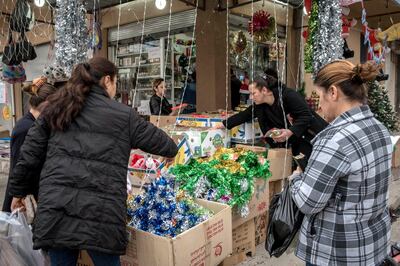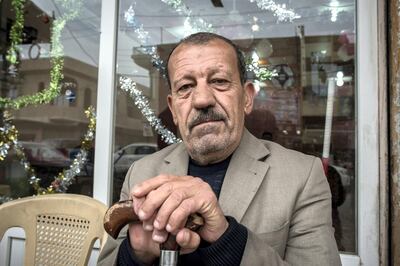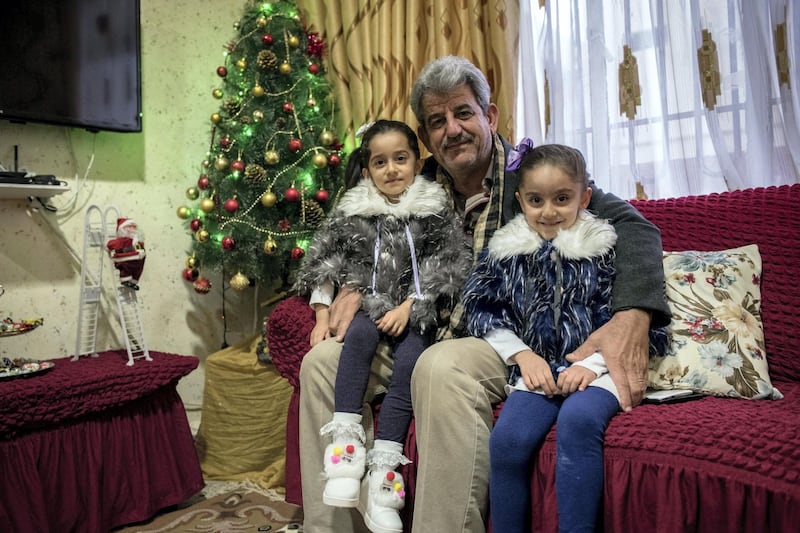The evening outside is gloomy but inside Louis Khno’s house is glowing with Yuletide cheer. A Christian from the Nineveh Plains town of Qaraqosh and the silver-haired patriarch of a family of 10 spread across three generations, Mr Khno wanted their first Christmas at home in four years to feel special. But after three years of ISIL occupation and a year of rebuilding efforts, Qaraqosh still looked like there was not much to celebrate: soot-streaked ruins, torn up roads, and ghosts of the past around every corner.
So the Khno family turned inwards to channel the Christmas spirit. The decoration began with a Christmas tree outside the wreath-bedecked front door of their freshly painted home. Inside, another Christmas tree in the kitchen, where Mr Khhno’s wife Imama has been baking cookies. Two more trees in the reception room, another two upstairs and the largest tree in the living room, where a mechanical Santa Claus climbs a ladder as Mr Khno’s two granddaughters — wearing new matching outfits — rush to offer sweets to visitors.
“Outside there is nothing, so you must make your house special,” says Mr Khno, a Qaraqosh council member. The over-the-top decorations are a deliberate psychological ploy. “That’s the point, to convince ourselves to stay here, to not think about emigrating, and to love our life in Iraq.”
After Iraqi security forces liberated their villages a year ago, Christians from the Nineveh Plains launched an urgent campaign to return as many as possible to their homes. Significant rebuilding efforts this year have made the towns inhabitable but as the returnees prepare to celebrate their first Christmas back, they are also struggling to convince themselves they have a future in their ancestral lands.
Qaraqosh today is half empty, but overflowing with memories for those who have returned. Its almost entirely Christian population fled, save for a few of the elderly, when ISIL overran the town in 2014. Rose-tinted nostalgia for how good life was before competes with the anxiety of knowing that for three long years strange men had the run of their town, ransacking homes and gleefully desecrating their holy places.
Mr Khno’s friend Yohanna Yousef Towaya returned home to find that ISIL members had prepared to torch his house by heaping up books and clothes in every room. “Something stopped them,” says Mr Towaya, who works for the Hammurabi Human Rights Organisation. It may have been the air strike that destroyed his parents' house next door.
“My mother still hasn’t seen her home destroyed,” he says, looking at the cinderblock-strewn yard where his family celebrated many Christmases past. “She is living nearby and says I’d need to bring a doctor with her if she went because the shock could kill her.”
Some residents who returned home decided to leave again once they saw the devastation. None of the roughly 7,000 homes in Qaraqosh were spared — 160 were destroyed by air strikes, 2,400 were torched by ISIL and 4,500 were looted and then damaged by three years of neglect. During the three years of displacement, nearly half of the town’s families moved permanently overseas.
A church-led drive to get people to return has successfully enticed about 4,000 families — perhaps up to 40 per cent of the 2014 population, says Mr Khno, who heads the town reconstruction committee. “The main goal is to get people back quickly.”
So far, the church-funded reconstruction committee has focused on homes which were lightly damaged, paying their owners between US$1,000 (Dh3,670) and $3,000 for repairs. The homes which were burned will cost much more to renovate, as much as $20,000. Services like water, sewerage and electricity remain patchy. The total reconstruction cost could run to $240 million, Mr Khno says.
With only basic repairs covered, each returning family must invest thousands of their own money to turn their houses into homes. “We were lucky that nearly everyone in my family had jobs,” says Mr Khno. “Other families just don’t have the money.”

In the main market street, shops play Feliz Navidad while storekeepers gamely hang Christmas lights to entice customers. Families shop for Christmas trees and tinsel decorations but business is a fraction of what it once was, shop owners say. Some fear they may not be able to stay open for long after Christmas. "In the past, you couldn't move in the market at this time of year it was so busy," says Shamal Ishaq outside his lighting store.
Part of the problem is that because of security concerns, Arabs from neighbouring areas who used to come to shop in Qaraqosh are no longer let past checkpoints manned by ethnic Shabak Popular Mobilisation Units. "They say they might be with ISIL," says Mr Towaya. "So they go to Mosul instead to shop."
In the face of continued hardship, most in Qaraqosh say they are determined to put their concerns for the future aside for one day. “We haven’t celebrated Christmas in four years,” says Laith Marzan Al Habib, standing outside his fruit and vegetable stall. “So Christmas this year will be special, even if half our relatives are abroad.”
The town will mark Christmas Eve with large bonfires and evening mass at church — to be held earlier than the customary midnight to make allowance for the current security environment. If the weather is fine on Christmas day, families will gather outside after attending church. Boys and girls will parade in the streets in their new clothes. The women will prepare feasts of traditional sausages, rice-stuffed vegetables, cakes, sweets and coffee. “We will still laugh together and drink,” says Mr Al Habib.
In the current climate, the importance of celebrating Christmas goes beyond having fun, says Mr Khno. It is about the future of Christianity and ethnic diversity in Iraq. “We will encourage ourselves and others to stay because every day we lose another family, the situation gets worse,” he says. “We need to send a positive message.”






